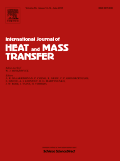
INTERNATIONAL JOURNAL OF HEAT AND MASS TRANSFER
Scope & Guideline
Charting New Territories in Thermal and Fluid Sciences
Introduction
Aims and Scopes
- Heat Transfer Mechanisms:
The journal covers various mechanisms of heat transfer, including conduction, convection, and radiation, emphasizing their applications in engineering and technology. - Mass Transfer Processes:
Research related to mass transfer phenomena, including diffusion, adsorption, and absorption, is a core focus, particularly in relation to energy systems and environmental processes. - Thermal Management Systems:
Studies on thermal management strategies for electronics, batteries, and other systems are prevalent, highlighting the importance of efficient heat dissipation. - Phase Change Materials (PCMs):
The journal features research on PCMs for thermal energy storage, focusing on their thermal performance, integration, and optimization in various applications. - Numerical and Experimental Methods:
A significant emphasis is placed on both numerical simulations and experimental studies, with many articles presenting hybrid approaches that combine theory and practice. - Innovative Thermal Technologies:
The journal explores advancements in thermal technologies, such as heat exchangers, cooling systems, and thermal insulation materials, showcasing novel designs and methodologies. - Multiscale Modeling and Analysis:
Research that integrates multiscale modeling approaches to understand complex thermal and fluid dynamics phenomena is increasingly prominent.
Trending and Emerging
- Nanofluid Applications:
Research on nanofluids, particularly their thermal properties and applications in heat exchangers and cooling systems, is gaining traction due to their enhanced performance. - Machine Learning in Heat Transfer:
The integration of machine learning techniques for predictive modeling and optimization in heat transfer applications is an emerging trend, reflecting the growing intersection of AI and engineering. - Sustainable Thermal Management Solutions:
There is an increasing focus on sustainable and energy-efficient thermal management solutions, including the use of phase change materials and innovative cooling technologies. - Advanced Materials for Heat Transfer:
Research on advanced materials, such as metamaterials and nanostructured surfaces, is trending, particularly for applications in thermal management and energy efficiency. - Electrohydrodynamic (EHD) Effects:
The exploration of EHD effects on heat transfer and fluid dynamics is becoming more prominent, indicating a shift towards understanding complex interactions in thermal systems. - Thermal Energy Storage Systems:
There is a growing interest in thermal energy storage technologies, particularly those utilizing phase change materials and hybrid systems, to improve energy efficiency.
Declining or Waning
- Traditional Heat Exchanger Designs:
There has been a noticeable decline in studies focusing solely on conventional heat exchanger designs, as research shifts towards more innovative and hybrid systems. - Simple Convection Studies:
Research centered on basic convection phenomena is decreasing, with more complex interactions in turbulent and multiphase flows gaining attention. - Basic Heat Transfer Theory:
Papers focusing on fundamental heat transfer theory without practical applications or novel insights seem less common, as the field moves towards applied research. - Single-Phase Flow Studies:
There is a waning interest in single-phase flow studies, with a noticeable shift towards investigations involving multiphase flows and their complex interactions. - Conventional Thermal Insulation Materials:
Research on traditional thermal insulation materials is becoming less frequent as newer materials and technologies, such as aerogels and biomimetic designs, take precedence.
Similar Journals

International Journal of Fluid Mechanics Research
Exploring the Dynamics of Fluid BehaviorThe International Journal of Fluid Mechanics Research, published by BEGELL HOUSE INC, is a pivotal platform for the dissemination of innovative research within the fields of Mechanical Engineering and Physics. With a focus on the intricate dynamics of fluid behavior, this journal has been a cornerstone of scholarly communication since its inception in 1996, continuing to engage a global audience of researchers and professionals through to 2024. With a respectable Impact Factor reflecting its significant contributions to the disciplines—ranking in Q3 for both Mechanical Engineering and Miscellaneous Physics and Astronomy categories—this journal presents a unique opportunity for authors to share their findings in a peer-reviewed environment. Although it does not currently offer Open Access options, all published articles are carefully curated, ensuring high-quality research is accessible to its readership. As the journal navigates the complexities of fluid mechanics, it fosters an interdisciplinary dialogue, bridging theoretical frameworks with practical applications, thereby enhancing understanding and innovation in related fields.

Frontiers in Heat and Mass Transfer
Exploring Innovative Research in Heat and Mass TransferFrontiers in Heat and Mass Transfer is a premier open-access journal published by TECH SCIENCE PRESS that focuses on the interdisciplinary field of heat and mass transfer. Established in 2010, this journal has been pivotal in disseminating high-quality research aimed at advancing the understanding of energy and material transport phenomena. With an impressive commitment to open access, it ensures that all published articles are readily available to researchers, practitioners, and students globally, promoting knowledge sharing and collaboration. The journal currently holds a Q3 ranking in key categories such as Engineering, Materials Science, and Physics and Astronomy, as well as notable positioning in Scopus rankings. With a forward-looking scope extending from 2010 to 2024, Frontiers in Heat and Mass Transfer continues to be an essential platform for innovative research, fostering the development of practical applications across various scientific and engineering domains. We invite you to explore the latest contributions to this evolving field and consider this journal as a vital resource for your academic and professional growth.

Heat Transfer
Bridging theory and practice in heat transfer science.Heat Transfer, published by WILEY, is a leading open-access journal dedicated to advancing the field of heat transfer science, encompassing innovative research and application across various domains. With an ISSN of 2688-4534 and an E-ISSN of 2688-4542, the journal aims to provide a platform for researchers to disseminate their findings from 2020 to 2024, focusing on condensed matter physics and fluid dynamics. Ranked in the Q2 category for both Condensed Matter Physics and Fluid Flow and Transfer Processes, it showcases articles that contribute significantly to the understanding and utilization of heat transfer mechanisms. Located in the United States at 111 River St, Hoboken, NJ 07030, the journal appeals to a diverse audience, including academic researchers, professionals in engineering, and students seeking to deepen their knowledge in thermal sciences. With a strong emphasis on accessibility, Heat Transfer promotes the exchange of ideas and experimental techniques, ultimately driving innovation and collaboration in the advancement of thermal management technologies.
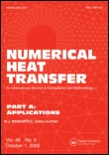
NUMERICAL HEAT TRANSFER PART A-APPLICATIONS
Driving excellence in numerical methodologies for heat transfer.NUMERICAL HEAT TRANSFER PART A-APPLICATIONS, published by TAYLOR & FRANCIS INC, serves as a premier outlet for cutting-edge research in the domains of numerical analysis and condensed matter physics. With an ISSN of 1040-7782 and an E-ISSN of 1521-0634, this esteemed journal has steadily maintained its influence in the academic community since its establishment in 1989, continuing its publication into 2024. Currently ranked in the Q2 quartile for both Condensed Matter Physics and Numerical Analysis, it stands as a vital resource for researchers committed to advancing computational methodologies and applications. The journal's Scopus rankings reflect its growing impact, particularly in mathematics, where it is placed in the top 26% of its category. Although not an open-access journal, its comprehensive research articles and detailed applications foster innovation and collaboration, making it essential for professionals and students aiming to deepen their understanding of thermal transfer phenomena through numerical techniques. This journal not only bridges theory and application but also propels forward the field of heat transfer.

Archives of Thermodynamics
Unveiling the Science of Heat and EnergyArchives of Thermodynamics is a reputable journal dedicated to the field of thermodynamics, published by the esteemed POLISH ACADEMY OF SCIENCES. With a robust history since its inception in 2003, this journal serves as a critical platform for disseminating high-quality research aimed at advancing knowledge and technology in thermodynamic systems and processes. Recognized for its contribution to the field, it holds a Q3 ranking in the Physics and Astronomy (miscellaneous) category as of 2023, with a respectable Scopus rank of #148 out of 243, placing it within the 39th percentile. Although it follows a traditional access model, the journal's commitment to scholarly excellence ensures that researchers, professionals, and students alike can benefit from its rich archives and ongoing discussions within the scientific community. Situated in Warsaw, Poland, the journal not only reflects a regional dedication to scientific progress, but also engages with global audiences interested in the evolving landscape of thermodynamic research.

Case Studies in Thermal Engineering
Elevating Knowledge in Thermal Engineering ExcellenceCase Studies in Thermal Engineering, published by ELSEVIER, stands as a premier platform for innovative research and analysis in the field of thermal engineering since its inception in 2013. With a robust Open Access model, this journal ensures that groundbreaking findings in fluid flow and transfer processes are readily accessible to a global audience, fostering collaboration and knowledge sharing across disciplines. Situated in the United Kingdom, the journal boasts an impressive impact factor, reflecting its status in the first quartile (Q1) for both engineering (miscellaneous) and fluid flow and transfer processes, as noted in the latest Scopus rankings. Researchers and professionals alike recognize its significance, ranking 9th out of 96 in Chemical Engineering and achieving a notable 91st percentile in its category. By publishing high-quality case studies, the journal aims to advance understanding and applications of thermal engineering principles, making it an essential resource for those looking to stay at the forefront of this dynamic field.
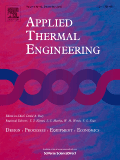
APPLIED THERMAL ENGINEERING
Unveiling the science behind efficient thermal solutions.Applied Thermal Engineering is a leading international journal dedicated to the field of thermal engineering, published by Pergamon-Elsevier Science Ltd. With an impressive impact factor indicating its significance in the academic community, this journal focuses on innovative research and developments related to energy engineering, fluid flow, and transfer processes, as well as manufacturing and mechanical engineering. Being indexed in top quartiles (Q1) across multiple categories, it ranks exceptionally well on platforms like Scopus, ensuring that contributors reach a wide and relevant audience. The journal supports both open access and subscription options, promoting the dissemination of vital research findings from 1996 to 2024. With its commitment to advancing the discipline and implementing rigorous peer-review processes, Applied Thermal Engineering serves as an essential resource for researchers, industry professionals, and students aiming to stay abreast of the latest advancements and applied methodologies in thermal science.

ASME Journal of Heat and Mass Transfer
Unlocking Knowledge in Heat and Mass TransferASME Journal of Heat and Mass Transfer, published by the renowned American Society of Mechanical Engineers (ASME), is a pivotal journal in the fields of mechanical engineering and materials science. With its ISSN 2832-8450 and E-ISSN 2832-8469, this journal aims to disseminate high-quality research focused on the principles and applications of heat transfer and mass transfer phenomena. Despite its recent launch, having converged from 2023 to 2024, it has quickly established a significant presence in the academic community, holding respectable rankings within the Scopus database across various categories—including a 66th percentile rank in Mechanical Engineering. The journal endeavors to foster innovation and collaborative research that advance the frontiers of knowledge in thermal sciences, making it an essential resource for researchers, practitioners, and students keen on exploring the challenges and developments in heat and mass transfer technologies. The journal also embraces an open-access model, ensuring that leading research reaches a broader audience and contributes to global knowledge sharing.
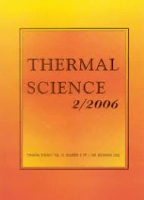
Thermal Science
Advancing sustainable energy solutions through innovative research.Thermal Science is an esteemed open-access journal published by the Vinca Institute of Nuclear Sciences in Serbia. With a rich focus on the field of thermal science, this journal has established itself as a vital resource for researchers and professionals interested in the dynamics of energy, renewable energy systems, and environmental sustainability. Since its inception in 2001, Thermal Science has dedicated itself to disseminating high-quality research that addresses the challenges of contemporary thermal technologies. The journal has converged its years of publication from 2007 to 2024 and currently holds a Q4 ranking in the category of Renewable Energy, Sustainability, and the Environment, with a Scopus rank of #172 out of 270, placing it in the 36th percentile. This makes it a crucial platform for sharing innovations and findings that contribute to the development of sustainable energy solutions. With open access options available, Thermal Science ensures that knowledge is readily accessible, fostering collaboration and advancement in this critical field.
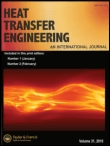
HEAT TRANSFER ENGINEERING
Driving the evolution of thermal management and engineering.HEAT TRANSFER ENGINEERING is a leading international journal published by Taylor & Francis Inc, dedicated to advancing the field of heat transfer and thermal engineering. With a strong focus on the key aspects of Condensed Matter Physics, Fluid Flow and Transfer Processes, and Mechanical Engineering, this journal covers a comprehensive range of topics from experimental studies to theoretical analysis, aiming to foster innovative research and practical applications. Since its inception in 1979 and continuing through 2024, the journal has established itself as an essential resource for researchers and industry professionals alike, reflected in its solid rankings within Scopus—holding a Q2 quartile classification in multiple engineering disciplines. Although not open access, the journal ensures broad accessibility through institutional subscriptions, making cutting-edge research readily available. With its rigorous peer-review process and commitment to quality, HEAT TRANSFER ENGINEERING plays a crucial role in shaping the future of thermal management solutions and engineering practices.